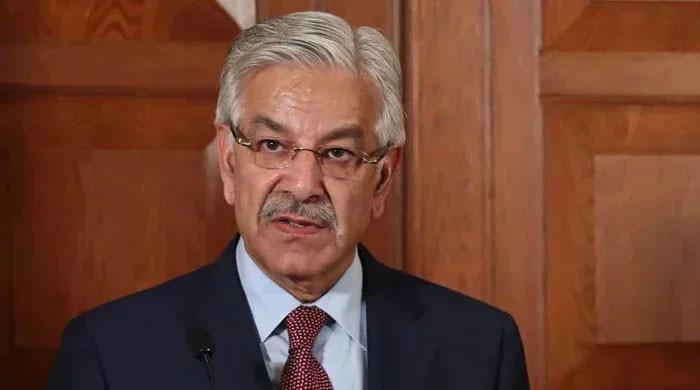 |
| Defence Minister Khawaja Asif. — AFP/File |
Khawaja Asif Declares: “No Demands from US” in Wake of Positive Turn in Pakistan-US Relations
Defence Minister Khawaja Asif. — AFP/FileDefence Minister Khawaja Asif said on Friday that Washington has placed no demands on Islamabad after the recent improvement in bilateral ties.Speaking on Geo News programme "Aaj Shahzeb Khanzada Kay Sath", Asif stated that the circumstances emerging...
In a recent televised appearance, Pakistan’s Defence Minister Khawaja Asif made a clear declaration: despite signs of warming ties, Washington has placed no demands on Islamabad. His remarks seek to dispel speculation that Pakistan’s renewed engagement with the United States comes with strings attached.
On Geo News’ Aaj Shahzeb Khanzada Kay Sath, Asif spoke candidly about the evolving dynamics between the two countries. He acknowledged a “positive turn” in relations, particularly influenced by shifting global conditions and shared security interests. But he also stressed that Pakistan would not concede to undue pressure. “If any demand does come, we will take a decision keeping in view our national interest,” he asserted. The News International
Context Behind the Statement
The timing of Asif’s remarks is significant. Only a day earlier, Prime Minister Shehbaz Sharif and Chief of Army Staff (COAS) Asim Munir met with U.S. President Donald Trump in the Oval Office. That visit was widely seen as a symbol of renewed engagement. During the white-house summit, issues like regional security, counterterrorism, and bilateral cooperation were on the agenda. The News International+1
Images from the meeting showed cordial interactions between the delegations. Trump’s public endorsement of Pakistan’s role in counterterrorism drew praise from PM Shehbaz, who described the U.S. leader as a “man of peace” and reaffirmed Pakistan’s willingness to deepen security cooperation. The News International
Asif’s clarification came in response to speculation that the U.S. might use Pakistan’s vulnerabilities—economic, security, or diplomatic—as leverage. But by firmly asserting Pakistan’s agency, he sought to reassure the public that Islamabad would not compromise sovereignty.
What “No Demands” Really Means
Asif’s statement doesn’t necessarily mean that future requests or expectations won’t arise. Rather, it signals that no overt conditions have been placed so far, and any that do will be evaluated through the lens of national interest. This stance aligns with a broader posture: maintaining diplomatic flexibility while safeguarding sovereignty.
In recent months, some analysts have speculated that the U.S. might push Pakistan to take firmer counterterrorism measures or recalibrate its regional alignments. With India’s growing influence and China–U.S. rivalry shaping foreign policy across Asia, Islamabad must tread carefully.
Khawaja Asif has in the past spoken about Pakistan–U.S. relations being “broader than any party, person or incident.” The News International That deeper framing helps explain how current engagement is being handled—not as a quid pro quo transaction, but as part of a longer strategic balancing act.
Why It Matters
Asif’s remarks carry multiple implications:
-
Domestic politics: By saying “no demands,” the government can counter criticism from opponents who argue that Pakistan is being coerced.
-
Diplomatic posture: The statement asserts Pakistan’s right to scrutinize or reject any foreign overtures that may undermine its interests.
-
Regional optics: In a region where alliances shift rapidly, demonstrating assertiveness to both Washington and neighboring capitals (especially in South Asia) strengthens Pakistan’s perception as a sovereign actor.
Still, the real test lies ahead. If U.S. requests arise—economic assistance, security cooperation, intelligence sharing—Pakistan must navigate them carefully to avoid perceptions of subservience or undue pressure.
FAQs
Q: What did Khawaja Asif say about demands from the U.S.?
He clarified that following recent positive developments in bilateral relations, no demands have been placed by Washington. He added that if any request arises, Pakistan will decide based on its national interest. Geo News+1
Q: What triggered talks of U.S. demands on Pakistan?
Speculation followed the Oval Office meeting where Prime Minister Shehbaz Sharif and COAS Munir held talks with President Trump on counterterrorism and regional security. Some feared that Pakistan might face pressure or conditions following that engagement. The News International
Q: How did Pakistan and U.S. relations improve recently?
War-driven shifts in regional security dynamics, increased cooperation on counterterrorism, and renewed diplomatic engagement have all contributed to what Asif called a “positive turn” in ties. Geo News+1
Q: What is Pakistan’s criterion for accepting any future demands?
Asif stressed Pakistan would evaluate any potential American request or demand based solely on the country’s national interest—preserving sovereignty and strategic independence. The News International
Q: Has Asif made similar statements about Pak-U.S. relations before?
Yes. Earlier in 2025, he said that Pakistan–U.S. relations transcend political parties or individual agendas, hinting at a long-term strategic view. The News International
